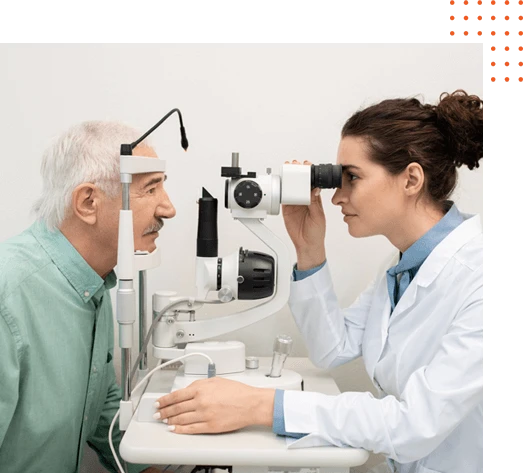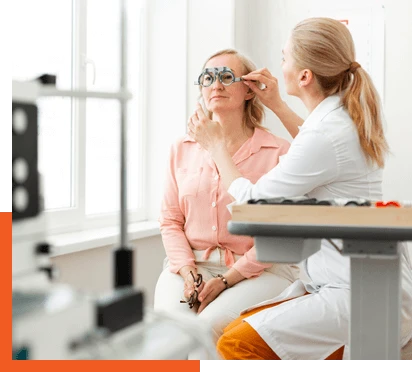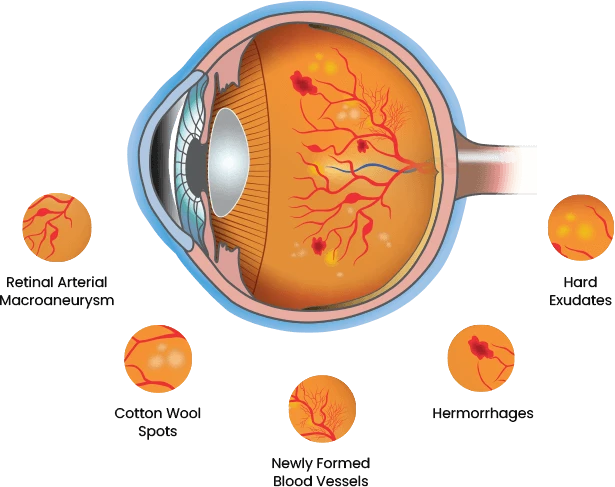Diabetic Eye Exam
Eyes on Brickell is a reputed and highly-rated Eye Clinic in Brickell, Miami. Our team of experienced eye doctors specializes in conducting diabetic eye exam in Miami. We understand the importance of regular eye exams for individuals with diabetes, as they are at a higher risk of developing eye complications, including test for diabetic retinopathy, glaucoma, and cataracts.
Our team utilizes state-of-the-art technology to conduct a comprehensive evaluation of your eye health, ensuring that any signs of diabetic eye disease are detected early and treated promptly. Our personalized approach ensures that we tailor the exam to meet the unique needs of each patient, and our compassionate team of diabetic eye exam doctor will guide you through the process, answering any questions or concerns you may have. At Eyes on Brickell, we are committed to providing exceptional and individualized care to each of our patients.
What is Diabetic Eye Exam?
A diabetic eye exam is a comprehensive eye examination that is conducted to detect the presence of any eye disorders or complications that may arise as a result of diabetes. The exam typically includes a visual acuity test, a dilated eye exam, and tonometry to measure eye pressure. During the exam, the eye doctor will evaluate the retina, optic nerve, and blood vessels in the eye for any abnormalities.
The exam is recommended for all individuals with diabetes, regardless of whether they have any noticeable eye symptoms.


What are the Benefits of Diabetic Eye Exam?
The benefits of a diabetic eye test are numerous. Firstly, the exam can help to detect eye disorders and complications early, when they are more easily treatable. This can prevent vision loss and blindness, which can have a significant impact on an individual’s quality of life.
Secondly, the exam can help to identify other health issues that may be related to diabetes, such as high blood pressure or high cholesterol. Finally, the exam can provide peace of mind, as it allows individuals to monitor their eye health and take proactive steps to maintain their vision.
How can Diabetes Affect My Eyes?
Diabetes is a chronic condition that can affect many different parts of the body, including the eyes. In fact, diabetes is the leading cause of blindness in adults in the United States. The condition can affect the small blood vessels in the retina, causing them to leak or become blocked. This can lead to a condition called diabetic retinopathy, which can cause vision loss or even blindness if left untreated.
Another complication of diabetes is diabetic macular edema, which occurs when fluid accumulates in the macula, the part of the retina responsible for central vision. This can cause blurred or distorted vision.
Finally, diabetes can increase the risk of other eye conditions, such as cataracts and glaucoma.

What are the Symptoms of Diabetic Retinopathy?
In the early stages, diabetic retinopathy may not cause any noticeable symptoms. As the condition progresses, however, individuals may experience:
- Blurred or distorted vision
- Floaters or spots in the field of vision
- Partial or total vision loss
- Difficulty seeing at night
- Colors appearing faded or washed out
- Eye pain or pressure
It is important to note that not everyone with diabetic retinopathy will experience symptoms. This is why regular diabetic retinopathy eye exams are so important, as they can detect the condition early before it causes significant vision loss.
What Are The Treatments For Diabetic Retinopathy?
It’s important to note that the effectiveness of these treatments depends on the severity of the disease and other individual factors. Therefore, it’s important to consult with an ophthalmologist or a retinal specialist to determine the best course of action for your specific case.


